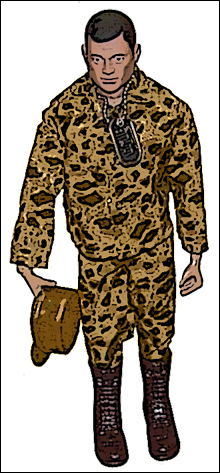
 A young former US Army sniper wearing a desert-camo uniform, an Iraqi kaffiyeh, and mirrored sunglasses scans a ruined urban landscape of smashed homes, empty streets, and garbage heaps. His sand-colored hat bears a small regulation-style military patch. instead of reading AIRBORNE or RANGER or SPECIAL FORCES, it says SHITBAG — common military parlance for bad soldier.
A young former US Army sniper wearing a desert-camo uniform, an Iraqi kaffiyeh, and mirrored sunglasses scans a ruined urban landscape of smashed homes, empty streets, and garbage heaps. His sand-colored hat bears a small regulation-style military patch. instead of reading AIRBORNE or RANGER or SPECIAL FORCES, it says SHITBAG — common military parlance for bad soldier.
This isn’t Baghdad or Kabul. It’s the Gulf Coast, and the column of young men and women in desert uniforms carrying American flags are with Iraq Veterans Against the War (IVAW). They are part of a larger peace march making its way from Mobile to New Orleans. This is just one of IVAW’s ongoing series of actions.
In all, about 35 Iraq vets cycled through this weeklong procession of 250. For the young, often very broke, very busy veterans of Iraq and Afghanistan, that represents a fairly strong showing. But many casual observers, influenced by memories of Vietnam-era protesting, when veterans mobilized in the thousands, expected that US soldiers in Iraq would turn against the war faster and in greater numbers than they have. An estimated one million Americans have served in Iraq and Afghanistan, but so far IVAW has only about 250 members.
For many of the more activist IVAW vets, their political evolution did not follow the simple trajectory one might expect, from idealism at enlistment to post-combat disillusionment. In fact, many of them shipped off to war despite serious political misgivings. “I went to Iraq opposing the war,” says Garrett Reppenhagen, the former sniper with the irreverent potty-mouthed patch on his hat. Reppenhagen served a year with the Army’s First Infantry Division in and around the very violent city of Baquba. “I was reading Zinn’s People’s History and John Perkins’s Economic Hit Man before I went.”
What’s that? Someone went off to be killed or maimed or possibly to kill “hajjis” despite being an anti-war leftist? Yes, and Reppenhagen is not alone. A recent Zogby poll found that 29 percent of soldiers in Iraq favored immediate withdrawal, which some see as a sign of an imminent crisis in military discipline. But the poll could be read in exactly the opposite fashion. If the Army and Marines can keep the disgruntled soldiers fighting and fighting, even 70 percent of troops could favor immediate withdrawal and it would mean nothing.
The question for peace activists thus becomes: How is it that antiwar soldiers continue to fight? And what does it really take for an anti-war soldier to resist? The answers lie largely in the sociology of “unit cohesion” and the ways the military uses solidarity among soldiers as a means of social control. Similarly, the peace activism of IVAW requires the spread of an oppositional form of loyalty and camaraderie.
Genealog(ies) of cohesion
Since 1973, when Congress ended the draft, the armed forces have been restructured using unit cohesion as a form of deep discipline. In other words, social control in today’s military operates through a system that could have come straight from a text by French philosopher Michel Foucault: soldiers are managed not with coercion but with freedom. Because they join of their own free will, they find it almost impossible to rebel. Volunteering implicates them, effectively stripping away the victim status that conscription once allowed. Soldiers who might resist are guilt-tripped and emotionally blackmailed into serving causes they hate. During my time embedded in Iraq, I met several anti-war soldiers, but none of them considered abandoning their comrades. They said things like “you signed that paper” or “they got that contract” — as if contracts are never broken or annulled.
If veterans are supposed to be at the heart of the peace movement, then it would serve progressives to understand this new military culture. Understanding the world of the military is also important because it is a major force in the socialization of young working-class Americans. If you’re 20 or 22 and you’re not doing what many rich kids do (like a career-boosting summer internship in New York) or doing what some truly poor kids do (like going to state prison on drug charges), chances are you’re learning about responsibility and adulthood, and escaping small-town or inner-city America, courtesy of the US armed forces. One of the key lessons you’ll learn there is: look out for your comrades, because they’re looking out for you.
Since World War II, military psychologists, sociologists, and historians — most notably the army historian S.L.A. Marshall, who interviewed hundreds of combat veterans of the Pacific theater — have agreed that soldiers fight not for justice, democracy, or any other grand idea, but for the guy next to them. Unit cohesion is the real glue holding the US military together.